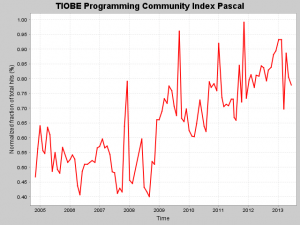One of the “novelties” of the NextGen Delphi compiler is immutable strings, which I find quite puzzling, for lack of a better word, given that Delphi already had reference-counted copy-on-write strings, and the NextGen compiler uses reference-counted strings.
I always considered that Delphi’s String type was one of its remaining strong points, being a high-level abstraction (higher than Java’s or .Net’s String/StringBuilder dichotomy) with excellent low-level performance (on par with C/C++ character arrays).
From the recent discussions, it appears many don’t know what makes/made Delphi String so special, so here is a quick summary.
(more…)
 I’ve closed the mini-pool, below are the results, obtained after 500 respondents, as well as some other stats not obviously evident from the poll results (as it was a multi-choice poll).*
I’ve closed the mini-pool, below are the results, obtained after 500 respondents, as well as some other stats not obviously evident from the poll results (as it was a multi-choice poll).* Work and processing classes are typically short-lived, created to perform one form of processing or another then freed. They can be simple collections, handle I/O of one kind of another, perform computations, pattern matching, etc.
Work and processing classes are typically short-lived, created to perform one form of processing or another then freed. They can be simple collections, handle I/O of one kind of another, perform computations, pattern matching, etc. As a followup to the
As a followup to the  Worst thing in popularity is not being considered, or found.
Worst thing in popularity is not being considered, or found.

